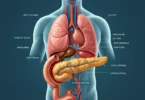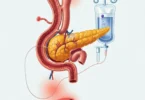The causes for the development of colorectal cancer are not yet fully understood. It is now known, however, that several causes are principally responsible for it.
In most cases, colon cancer comes from polyps produced. Colon polyps are benign protrusions in the intestinal mucosa. If these polyps degenerate and form cancer cells, colon cancer arises. Who polyps, has an increased cancer risk. Even if close relatives had or have polyps your own risk is increased. These are mushroom-like protrusions of the intestinal mucosa, which grow in the intestinal area. Approximately 90 percent of colon cancers arise because these polyps degenerate, their cells are therefore transformed into cancer cells. If the polyps removed in time for a colonoscopy (colonoscopy), colon cancer can be frequently prevented.
In rarer cases, a change in the genetic material at birth is present. Then Colon diseases are very common in the family. It is estimated that a total of about 10-15 percent of all colon cancers attributable to such hereditary preloads.
The risk of colon cancer, rises steadily with age. Approximately 90 percent of colorectal cancers occur after age of 50. The mean age of colorectal cancer in men is 71 years, whereas the median age of colorectal cancer in women is 75 years. Certain lifestyle and eating habits, and hereditary factors play a role in the development of colon cancer.
Diet and lifestyle
Doctors were able to identify several factors of diet and lifestyle associated proven with an increased risk for colon cancer. These include a low-fiber, high-fat and especially meat-rich diet (especially red meat). It is believed that the carcinogenic substances due to slowed intestinal transit remain in contact with the intestinal mucosa for longer time and thus damage the intestinal cells. In addition, lack of exercise and obesity contribute to the development of colorectal cancer. Alcohol and nicotine increase the risk of colorectal cancer (as well as other cancers).
Heredity
In about ten percent of cases, cancer is heritable. This means that the defect is created in the genetic material at birth. In general, the risk of colon cancer appears to be increased when a close relative (eg parents) has been diagnosed with colon cancer. But there are also two hereditary diseases (HNPCC and FAP), in which the risk of colon cancer is significantly increased:
HNPCC (hereditary nonpolyposis colon cancer)
Hereditary non-polyposis colorectal cancer is the most common hereditary colorectal cancer (also known as Lynch syndrome). In this disease, various repair systems for the genetic material are defective because of genetic mutations. People with HNPCC have 80 percent chances of developing colon cancer. In addition, the risk of further cancers such as uterine, ovarian and gastric cancer is significantly increased. If mutation of the genetic material is present in one parent, than 50 percent of the children are at risk of developing this disease (autosomal dominant inheritance).
FAP (familial adenomatous polyposis)
People with FAP must be carried out colon cancer screening as early as possible (at the age of ten). Frequently precaution bowel sections must be surgically removed to prevent cancer in FAP. Approximately one percent of all cancer cases can be attributed to the FAP.
Other rare inherited disorders as a cause of colon cancer
In addition to the HNPCC and FAP, there are also other rare inherited disorders in which there is formation of adenomas and thus to increased risk of intestinal cancer. These include the
- Peutz-Jeghers syndrome
- Familial juvenile polyposis.
Other risk factors for colon cancer:
Age: the higher the age, the higher the risk for colorectal cancer. 90 percent of all colon cancers occur after age 50.
Inflammatory bowel disease: people suffering from ulcerative colitis or Crohn’s disease suffer have an increased risk of colon cancer. In ulcerative colitis, the risk is even increased by five times.
Diabetes (diabetes mellitus type 2): People with type 2 diabetes have at the initial stage of the disease increased insulin levels in the blood. These are responsible for ensuring that the risk of developing colon cancer is increased about three-fold in the opinion of doctors.
Before cancer protective factors (protective factors)
In addition to these risk factors for colorectal cancer, there are also factors that protect against cancer. These include regular physical activity and a high-fiber, low in meat. The motion and the fiber stimulate the bowel movements, so that stool passage is shortened by the intestine. Therefore toxins in the stool may be less long acting on the intestinal mucosa, increasing the risk for colorectal cancer is reduced.
Almost all colon cancers are apparent from an adenoma
About 90 percent of colon cancers arise from so-called polyps (adenomas). These are benign growths that occur about every other people in the course of life. However, the degenerate polyps in the course of a few years may cause some people to malignant cancer (so-called adenoma-carcinoma sequence).
Physicians therefore called adenomas as so-called precancerous lesions (precursors of cancer). The development of normal intestinal mucosa through the formation of polyps up to the degeneration to cancer takes about ten years. During this time held various genetic mutations that make it ultimately comes to the development of colon cancer.
There are different polyp forms according to histological (histological) features: The most common are tubulose polyps (low risk of malignancy). Rare are villous polyps (great risk of malignancy). There are also tubulo-villous mixed forms. Usually polyps are not noticed by the person concerned.
For more general information…..






